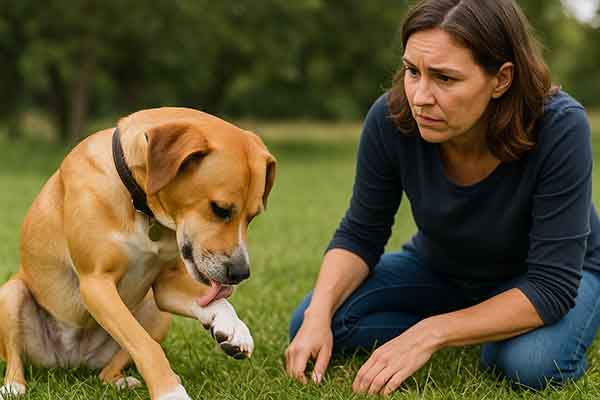Can Dogs Be Allergic to Grass? | Causes, Symptoms & Treatment
Just like humans, dogs can develop allergies to a wide range of environmental triggers. One common culprit that surprises many pet owners is grass. If your dog seems itchy, licks their paws excessively, or breaks out in rashes after outdoor play, you might wonder: Can dogs be allergic to grass?
The answer is yes. Dogs can develop allergic reactions to grass, and these reactions can range from mild to severe. In this article, we’ll explore the signs of grass allergies in dogs, what causes them, how they’re diagnosed and treated, and what you can do to protect your pup from discomfort.
Table of Contents
- What Is a Grass Allergy in Dogs?
- Signs and Symptoms of Grass Allergies in Dogs
- What Causes Grass Allergies in Dogs?
- How Are Grass Allergies Diagnosed?
- Treatment Options for Grass Allergies in Dogs
- Tips to Prevent Grass Allergy Flare-Ups
- When to See a Vet
- FAQ
What Is a Grass Allergy in Dogs?
A grass allergy occurs when a dog’s immune system overreacts to proteins found in grass, grass pollen, or even mold that grows on grass. This type of allergic reaction is typically categorized under atopic dermatitis—a chronic skin condition triggered by environmental allergens.
Unlike food allergies, which are caused by ingredients in a dog’s diet, grass allergies are external and usually seasonal, though in some climates they may persist year-round.
Signs and Symptoms of Grass Allergies in Dogs
Symptoms of grass allergies in dogs can range from skin irritation to respiratory discomfort. Common signs include:
- Red, itchy skin (especially on belly, paws, or chest)
- Frequent licking or chewing of paws
- Rashes or hives
- Hair loss or thinning coat
- Watery eyes or sneezing
- Ear infections or head shaking
- Dry, flaky, or inflamed skin
If your dog experiences these symptoms primarily after being outside, grass could be the cause.
What Causes Grass Allergies in Dogs?
Grass allergies in dogs are caused by an overactive immune response to proteins in:
- Live grass blades
- Grass pollen released during certain seasons
- Pesticides or fertilizers used on lawns
- Mold or fungi growing on grass
Breeds such as Golden Retrievers, Bulldogs, Terriers, and Setters are more prone to developing environmental allergies, including grass sensitivity.

How Are Grass Allergies Diagnosed?
Your vet can help confirm whether your dog has a grass allergy through several methods:
1. Clinical History
Reviewing when and where symptoms occur (e.g., after walks or yard time) can offer strong clues.
2. Rule-Out Process
Allergies to food or fleas are often ruled out first through elimination diets or flea control trials.
3. Intradermal Allergy Testing
Small amounts of allergens are injected into the skin to identify specific triggers—similar to human allergy testing.
4. Blood Testing
Serum allergy tests can identify antibodies to certain environmental allergens, including types of grass.
Accurate diagnosis is key to effective treatment, so don’t skip a vet visit if your dog’s symptoms are persistent.
Treatment Options for Grass Allergies in Dogs
While there’s no permanent cure for environmental allergies, several treatment options can help manage symptoms and improve your dog’s comfort.
1. Antihistamines
Over-the-counter medications like Benadryl (diphenhydramine) can offer mild relief. Always consult your vet for dosage and safety.
2. Steroids
Corticosteroids may be prescribed to reduce inflammation in more severe cases, though long-term use is generally avoided.
3. Cytopoint Injections
This vet-administered injection targets itch-specific pathways and can provide relief for 4–8 weeks.
4. Apoquel (Oclacitinib)
An oral prescription medication that targets the source of itch and inflammation without steroids.
5. Allergy Immunotherapy (Hyposensitization)
Custom allergy shots or drops are formulated based on your dog’s test results to build long-term tolerance over time.
6. Medicated Baths
Oatmeal-based or hypoallergenic shampoos help soothe irritated skin and remove allergens from the coat.
Tips to Prevent Grass Allergy Flare-Ups
While avoiding grass completely may not be realistic, there are steps you can take to reduce your dog’s exposure and minimize reactions:
- Rinse your dog’s paws and belly with water after walks
- Keep your lawn short to reduce pollen levels
- Limit outdoor time during peak allergy seasons (spring/summer)
- Wipe down your dog with pet-safe grooming wipes after play
- Use HEPA filters indoors to trap airborne allergens
- Wash bedding and toys regularly
Preventative care can go a long way in keeping your dog’s symptoms manageable.
When to See a Vet
Contact your veterinarian if your dog:
- Has persistent or worsening skin issues
- Develops open sores or secondary infections
- Is constantly scratching or chewing paws
- Seems uncomfortable or irritable
Early intervention helps prevent chronic skin conditions and keeps your dog’s quality of life high.
FAQ
Can dogs really be allergic to grass?
Yes, dogs can be allergic to proteins found in grass, pollen, or mold. These allergies are common and often seasonal.
Are certain breeds more prone to grass allergies?
Yes. Breeds like Golden Retrievers, Boxers, Bulldogs, Pugs, and Terriers are more genetically predisposed to environmental allergies.
Can grass allergies go away on their own?
Most dogs won’t outgrow grass allergies. Symptoms can sometimes lessen with time or treatment, but most require ongoing management.
Can I still walk my dog if they have a grass allergy?
Yes—but take precautions. Rinse their paws and underbelly after walks, and avoid grassy areas during high pollen times.
What’s the best treatment for grass allergy in dogs?
The best treatment depends on your dog’s symptoms and severity. Many vets recommend a combination of antihistamines, allergy medications like Apoquel or Cytopoint, and regular bathing with medicated shampoos.
Conclusion
So, can dogs be allergic to grass? Absolutely. While it might seem surprising, grass allergies are one of the most common environmental triggers for canine discomfort. From itchy skin to recurring ear infections, the symptoms can be unpleasant—but they are manageable with the right care and attention.
If you suspect your dog has a grass allergy, consult your vet for a proper diagnosis and personalized treatment plan. With consistent care and preventative measures, your pup can enjoy the great outdoors without the itch.


